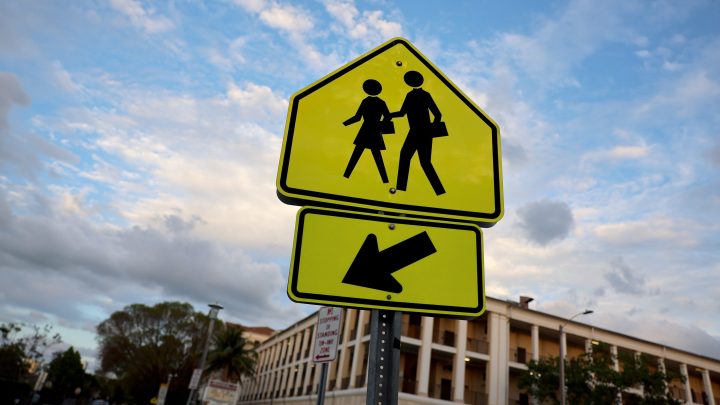
Fewer Americans are walking these days. What gives?

Since the start of the pandemic, fewer people are walking to get around. The 100 most populated metro areas in the U.S. saw a decline in walking of at least 20% between 2019 and 2022, according to a recent report. But even with this decline, pedestrian deaths have skyrocketed to the highest they’ve been in over 40 years.
“Cars are driving faster, their drivers are driving more recklessly, and enforcement has been down,” said Linda Poon, staff writer at Bloomberg CityLab. “So there’s less of an incentive to walk.”
Poon joined Marketplace host Amy Scott to discuss her reporting on why Americans have shied away from walking as a means of transportation. Below is an edited transcript of their conversation.
Amy Scott: Why are we walking so much less?
Linda Poon: Well, there’s a lot of explanations, and it differs from place to place. But some of the ones that urban experts have come up with is that the roads have become generally more dangerous. Cars are driving faster, their drivers are driving more recklessly, and enforcement has been down. So, there’s less of an incentive to walk. There’re also theories regarding the rise of online deliveries. Everyone’s just using Amazon and getting their packages delivered. So, there’s less reason to go out outside your house. Those are sort of the general trends.
Scott: It strikes me that this decline is happening at the same time that it seems like there’s increased awareness about the benefits of walking. You know, there are all those people out there counting their steps, wearing their fitness watches, not to mention all the dogs people adopted during the pandemic. Somebody’s got to be walking them. Were you surprised by this decline?
Poon: Yeah, especially with the dog part. I know I’ve gotten a dog and I’ve walked so much more than I have in the past. But I think it sort of comes down to the difference between walking as a commuting choice versus recreationally. Maybe there are more people who are walking recreationally, but because there is less commuting walking, that may have put a dent in it. And also, maybe less surprising is that U.S. has generally not had a great walking track record compared to other countries. Cities here are generally built around cars. And so, there’s less of an incentive to choose walking as your main mode of transportation over cars.
Scott: Yeah, and there’s a really frightening statistic on that safety issue: 7,500 pedestrians were killed in traffic accidents last year. That’s at the same time that people are walking less. How do experts explain this rise in in traffic fatalities?
Poon: Right. So, it isn’t so much that there are fewer pedestrians on the road, but the fact that drivers are driving a little bit faster, a bit more recklessly. And part of that motivation is because the pandemic kept people at home, so the roadways were a bit emptier, there were less congestion that gave people a little bit more motivation to drive faster.
Scott: And you also point out cars have gotten heavier. You see all those huge trucks with the big front end, and that is more deadly, frankly.
Poon: Yeah, so one of the main things is that they’re kind of riding higher off the ground. So, when cars do hit pedestrians, they’re hitting them along the torso rather than the legs. I recently went car shopping, and it was so hard to find a car that wasn’t really, really big. It’s just been a trend that SUVs, pickup trucks are becoming sort of favorites among drivers.
Scott: Besides the obvious potential health benefits to consider, should we care that people are walking so much less generally? Why does this matter?
Poon: Yeah, I mean, public health is a very strong reason already. If we’re thinking about the future and the climate crisis, we’re trying to get people out of cars. And we’re not making walking a realistic choice of transit. That certainly sort of dents that progress to get cars off the road and lower carbon emissions.
There’s a lot happening in the world. Through it all, Marketplace is here for you.
You rely on Marketplace to break down the world’s events and tell you how it affects you in a fact-based, approachable way. We rely on your financial support to keep making that possible.
Your donation today powers the independent journalism that you rely on. For just $5/month, you can help sustain Marketplace so we can keep reporting on the things that matter to you.











